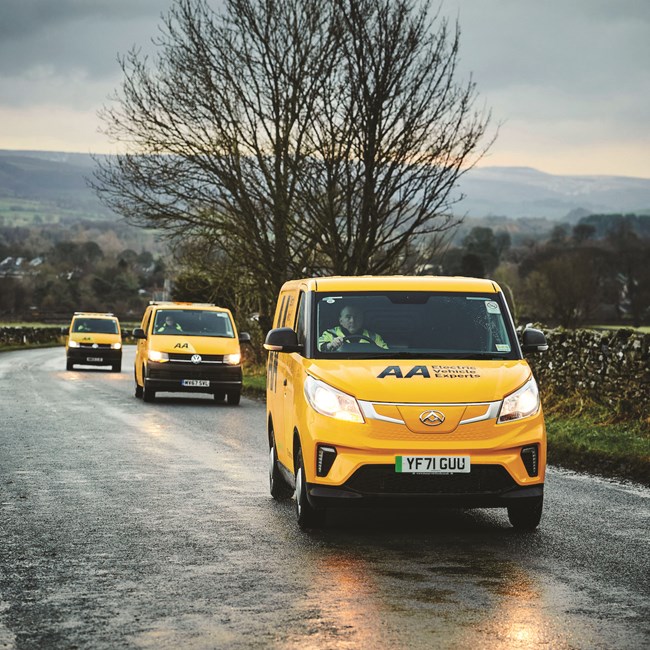We use cookies to ensure that we give you the best experience on our website. If you continue without changing your settings, we will assume that you are happy to receive all cookies on the Business Car website. However, if you would like to, you can change your cookies at any time

The start point for the best source of fleet information |
ADVERTISEMENT FEATURE: Prepare your fleet for the EV transition
Date: 15 November 2022

Business grey fleets are likely to be experiencing something of a lag when it comes to EV transitioning, which can be linked to the current rising living costs. The Office of National Statistics recently found that 87% of adults reported a rise in their cost of living from August to September 2022 . Ultimately, these factors impact whether drivers can afford the transition to electrification.
The pandemic has seen grey fleets, cars owned by the employee rather than the employer, surge in popularity as businesses strive to cut costs. There are now around 14 million grey fleet vehicles on UK roads.
However, grey fleets present an environmental headache for managers striving to reach sustainability goals, as they have little control over the type of vehicles purchased and owned by employees but business transport can still count towards their emissions.
In a recent AA Yonder Driver Poll, three fifths (63%) of drivers say they're already put off buying an electric vehicle (EV) because of the rising cost of domestic energy, when, in reality, EVs are still cheaper to run than petrol and diesel cars even after taking rising energy prices into consideration.
New AA research also shows that one in ten used vehicle drivers are putting off updating their vehicle. Indeed, 9% of drivers with models aged more than four years old are holding off swapping their car for an EV until the 'right time'. The most common reason drivers are choosing not to upgrade is that they don't feel the need for a new one (63%). Meanwhile, younger drivers were significantly more likely to be waiting for finance or a loan to end before they upgrade their car (11% of 25-34-year-olds) than older drivers.
Our research shows regional differences towards EV take-up too. We found drivers in London are twice as likely as those in Wales, Yorkshire and the north-east to ensure their next car is an EV (13% versus 7%). This is a likely result of the ULEZ charge, which was introduced in London in 2019.
As a result, we expect to see grey fleet drivers hanging onto their older vehicles for longer, which will undoubtedly impact sustainability goals and also overall fleet condition - older vehicles are more prone to break down due to natural wear and tear. It's well known that businesses lose income for every day a vehicle is off the road. But with drivers displaying signs of EV transition hesitancy, what do managers need to be aware of when it comes to managing a staggered grey fleet take-up in terms of decarbonisation and risk reduction?
Make sure employees are servicing their vehicles
A third of motorists are looking to give servicing their vehicles a miss this year to claw back funds lost to the cost-of-living crisis, according to warnings from The Motor Ombudsman. However, missing a service leaves drivers at higher risk of mechanical failure, leading to periods of business downtime if vehicles are off road for any period of time. Better engine efficiency as a result of recent servicing reduces pollution and vehicle emissions too.
Encouraging employees to forward book MOTs and servicing is also highly beneficial when it comes to reducing VOR, or vehicle off-road time. Prestige Fleet Servicing, part of the AA, offers a 90-day forward booking facility for MOTs, freeing up driver and fleet manager time for more business-critical issues.
Ensure your employees are also aware of other specifics, which could decrease risk of vehicle downtime and avoid additional expenses, such as driver training courses. The team over at Drivetech have a wide variety of options that includes driving their vehicles more efficiently as well as building employee confidence in driving EVs.
Inform employees of the benefits of leasing
Car ownership is already changing with modern drivers less wedded to traditional ownership and finance options than ever before. Making employees aware of the benefits of leasing vehicles is certainly an option for fleet managers with a hefty grey fleet burden who are looking to decarbonise to meet business goals. AA Smart Lease believes leasing is a flexible, low-risk way to try an EV before, or even without, buying. From a business perspective, it could well prove a solution for managers looking to decarbonise their grey fleets.
AA Lease works like a long-term rental, allowing employees to experience the benefits of newer vehicles, including EVs, without buying outright. Employees can pay a monthly fee to drive a brand-new car for between two to four years, with total control over the period of lease. The AA Lease monthly fee also includes vehicle tax and AA breakdown cover for extra peace of mind.
Ensure employees are aware of EV servicing requirements
Fleets that are further ahead on EV transitioning should be aware of new guidance on the topic from the Health & Safety Executive (September 2021). Business fleet policies must give due consideration to EV and grey fleet vehicle safety, ensuring drivers are aware enough of the technology to operate, charge and service their vehicles appropriately.
With you every step of the way
Wherever your business is on its alternatively fuelled journey, remember that we are here to ease the process. We can help your business to meet the challenges of today and tomorrow together, every step of the way.
To find out more about AA Business Services, please visit: https://www.linkedin.com/showcase/the-aa-business-services/
For media enquiries, please contact Prova Public Relations on 01926 776 900 or email theaa@provapr.co.uk











